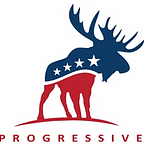Conservatism is Inherently Wrong (Part 1)
Regardless of where an individual falls in the political spectrum, they likely have a cluster of fairly coherent beliefs that can mostly fit them into a given political ideology.
Despite the fact that many of us have been taught to equally respect the perspective of others, it is probably time to challenge that notion. Specifically when it comes to political conservatism.
To be clear, the argument here isn’t that conservatives are always wrong, or that every core tenet of conservatism is incorrect.
Rather the very concept of political conservatism is inherently flawed. Merriam-Webster defines conservatism as:
a political philosophy based on tradition and social stability, stressing established institutions, and preferring gradual development to abrupt change.
As a society that is comprised of real, living human beings with equally real issues to deal with — a political philosophy focused on tradition and social stability is almost intentionally missing the point.
Beliefs and traditions change over time, particularly as our understanding of the human condition deepens. To use a specific example, across multiple cultures in humanity, marriage has been between a man and woman.
A cisgender man and woman at that if we’re going to be specific. The many reasons why this was the case is beyond the scope of this article. However, this tradition and the baggage that accompanied it was slowly eroded over time by social progress.
This has resulted in a shift from where politicians would once openly denounce homoromantic marriage, compared to now where it just isn’t mentioned — regardless of what they may believe personally.
This is why progressives often feel confident in warning their more conservative counterparts that they will be “on the wrong side of history” when it is all said and done — because largely they have been.
Conservatives slowly shifted from outright opposition to same-sex marriage, to reluctantly supporting it legally with caveats, to now being mum on the issue since the Supreme Court legalized same-sex marriage.
Obviously there is nothing about same-sex marriage that has changed over time. It always should have been the legal right of any individual to get married, regardless of their sexual orientation.
With a conservative outlook, the best case scenario is the hope that it gradually (even if reluctantly) gets pulled in the correct direction. Rather than arguing against a policy change on the merits of the policy, conservatism’s response is simply- “but that’s not how we do things.”
To be sure, change merely for the sake of it is not better, but if we aren’t actively attempting to progress as a society, what are we doing?
Clearly there are many factors at play, and this cannot be stressed enough. It is easier to be a conservative if the current status quo directly benefits you, or if you have been convinced that it does/can benefit you.
Individual conservative values, insofar as they may or may not hold value, if they must be held — should be done so in a vacuum. Meaning that appealing to conservatism itself should never be a defense against change. As an example, a push to remove “In God We Trust” from currency, or to get rid of the pledge of allegiance in public schools should not be met with resistance because, “that’s what makes us American”.
By placing higher value on tradition, and by being skeptical of change and innovation in general, humans are de-valued. This is likely not the intention of the vast majority of people that identify as conservatives, but it is the outcome nonetheless.
That being said, for the sake of being clear, conservatism does not automatically mean supporting all traditional structures. Particularly since change can happen at anytime and become the status quo — the change that conservatism seeks to fight against is relatively cherry-picked and even shifts somewhat over time.
Disclaimers aside however, the point remains, at its face, conservatism demands respect of specific traditional structures. This is inherently in conflict with the human condition.
